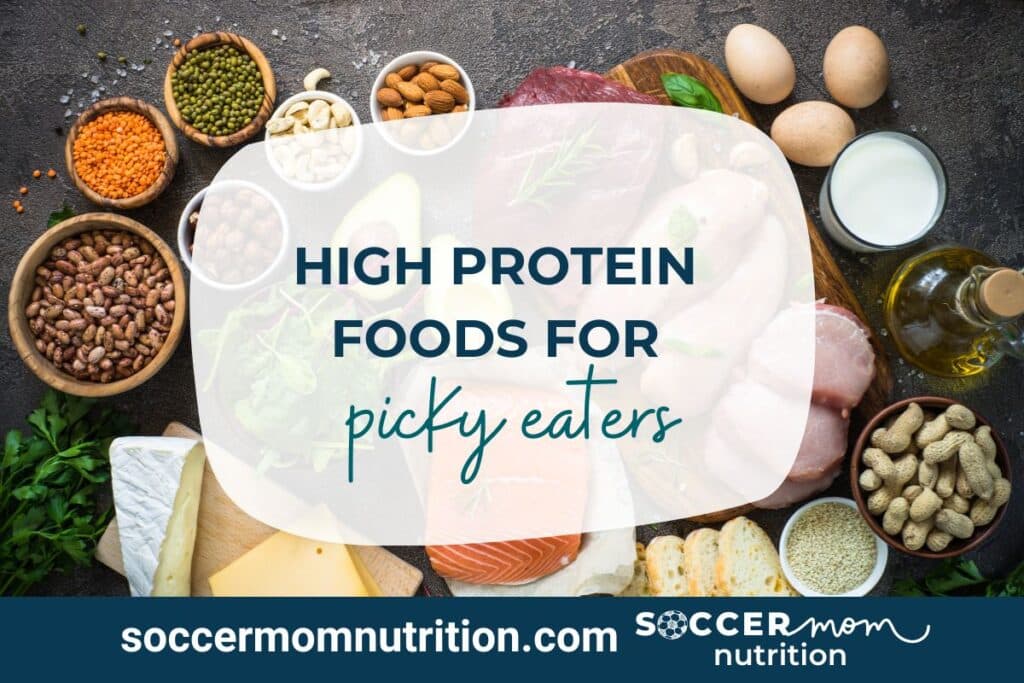High Protein Foods for Picky Eaters
Struggling to find high protein foods for picky eaters? You’re not alone. Many athletes parents of athletes face this challenge daily since kids need protein rich foods in their diets.
Protein is essential for growth, development, and muscle repair, especially for active kids. But how do you make protein-rich foods appealing to your athlete?
In this guide, we’ll dive into practical, tasty ways to introduce more protein into your athlete’s diet, while also making mealtime fun and engaging.

Tips for picky eaters to enjoy high protein foods
Raising an athlete often means paying extra attention to their diet, ensuring they get enough protein for their active lifestyle. However, picky eaters pose a unique challenge. The key is to introduce protein rich foods in a way that’s both appealing and varied.
Here are some nutrition tips to encourage high protein foods for picky eaters:
Involve them in cooking and shopping
Kids are more likely to eat what they’ve helped prepare and pick out at the grocery store. Use this opportunity to teach them about the protein content of different foods and how they benefit their body.
Creative presentation
Fun shapes, colorful arrangements, and playful names can make protein-rich foods more attractive. A few ways to do this would be to make “egg muffins” with eggs, cheese, and veggies, or cut cheese slices into stars and hearts.
Mix with favorites
Incorporate high-protein ingredients into meals they already love. For example, you can add shredded chicken to pasta, cheese to pizza, blend cottage cheese into a smoothie, or peanut butter to pancakes.
Offer variety
Regularly introduce new protein sources to prevent boredom and expand their palate. Have your athlete try different types of fish, nuts, seeds, beans, lentils, tofu, or tempeh prepared with their favorite sauces or side dishes.
Positive reinforcement
Praise their willingness to try new foods, however small the bite. Avoid forcing, bribing, or punishing them for not eating. Instead, focus on the positive aspects of eating protein, such as feeling strong, healthy, and energetic.

Highest protein foods
Understanding the protein content in common foods is crucial for planning meals. Here’s a table detailing high-protein foods, their serving sizes, and protein content, based on the USDA database:
| Food | Protein Content per Serving | Serving Size |
| Chicken Breast | 31g | 3.5 ounces |
| Turkey | 29g | 3.5 ounces |
| Pork Loin | 26g | 3.5 ounces |
| Salmon | 25g | 3.5 ounces |
| Tuna Salad (Canned) | 20g | 3.5 ounces |
| Canned Chicken | 21g | 3.5 ounces |
| Greek Yogurt | 10g | 6 ounces |
| Cottage Cheese | 14g | 1/2 cup |
| Edamame | 17g | 1 cup (cooked) |
| Beef Jerky | 20g | 1 ounce |
| Quinoa | 8g | 1 cup (cooked) |
| Lentils | 9g | 1/2 cup (cooked) |
| Milk | 8g | 1 cup |
| Chickpeas | 15g | 1 cup (cooked) |
| Peanut Butter | 8g | 2 tablespoons |
| Almonds | 6g | 1 ounce |
| Eggs | 6g | 1 large egg |
| Swiss Cheese | 8g | 1 ounce |
| Cheddar Cheese | 7g | 1 ounce |
| Mozzarella Cheese | 7g | 1 ounce |
| Pumpkin Seeds | 5g | 1 ounce |
| Chia Seeds | 5g | 2 tablespoons |
| Parmesan Cheese | 10g | 1 ounce |
| Black Beans | 15g | 1 cup (cooked) |
High protein packed foods ideas for picky eaters
Now that you know some of the best sources of protein, how do you make them appealing to your picky eater?
Here are some examples of high-protein foods and how to make them tasty and fun:
Greek yogurt
Rich and creamy, Greek yogurt is a delightful source of protein. It’s perfect for breakfast bowls, mixed with fruits and granola for a nutritious start. You can also make it into a fun dip for fruits or veggies.
For example, you can mix Greek yogurt with honey and cinnamon, or with ranch seasoning and herbs.
Cottage cheese
Cottage cheese can be a game-changer for protein intake. It’s also a great late evening snack or dessert. Try creating parfaits, mixing it with fruits, or using it as a spread on crackers.
Encourage your young athlete to mix in their favorite fruits or a drizzle of honey. You can also make cottage cheese pancakes, muffins, or cheesecake for a protein-packed treat.
Eggs
Eggs are incredibly versatile. Involve your child in making scrambled eggs, omelets, or frittatas with their choice of veggies and cheese. For younger athletes, try making fun shapes with egg molds, or use cookie cutters to make egg-in-a-hole.
Serve eggs in a variety of ways such as hard-boiled eggs, deviled eggs, or egg salad for a quick and easy snack.
Peanut butter
Peanut butter is not just nutritious but also immensely popular with kids. Spread it on toast, mix it into oatmeal, or use it to make no-bake peanut butter balls. Kids can enjoy making their own peanut butter sandwiches or dipping apple slices into it.
You can also make peanut butter smoothies, cookies, or brownies for a delicious dessert.
Cheese
Incorporate cheese into meals for added protein and calcium. Whether it’s sprinkled over salads, melted in sandwiches, or used in baking, cheese is often a kid favorite. You can also make cheese sticks or cubes for a simple snack.
Try different varieties of cheese, such as cheddar, mozzarella, parmesan, or feta, and pair them with fruits, nuts, or crackers.
Milk
Milk is an easy addition to a child’s diet. Use it in cereals, smoothies, or just as a drink. High protein milk boosts protein and calcium content. Flavored milk can also be an occasional treat and it makes a great post game snack.
Soy or almond milk are great high protein milk alternatives (depending on the brand) for those who prefer non-dairy options. You can also make homemade hot chocolate, milkshakes, or pudding with milk.
Nuts and seeds
Nuts and seeds are great for snacking or as additions to meals. Create a custom trail mix with your child, choosing their favorite nuts and seeds, and maybe even adding a bit of dark chocolate. Boost carbohydrate content by mixing in some dry cereal.
Granola bars, protein bars or energy bites with nuts and seeds. Sprinkle them over salads, yogurt, or oatmeal for extra crunch and protein.
Oats and quinoa
Oats and quinoa are excellent bases for creative meals. Make oatmeal or quinoa bowls with a variety of toppings, allowing kids to choose their favorites. These can be sweet with fruits and honey, or savory with veggies and cheese.
You can also make oat or quinoa pancakes, muffins, or cookies for a hearty breakfast or snack.

Beans and lentils
Beans and lentils are protein-rich and versatile. Involve your child in making bean burritos, lentil soups, or veggie burgers. These are great for experimenting with different flavors and seasonings.
Try new recipes to make hummus, bean dip, or lentil salad with beans and lentils. Serve them with whole-wheat pita bread, tortilla chips, or fresh veggies.
Tofu and tempeh
Tofu and tempeh are plant-based proteins that can be used in many dishes and are enjoyed by vegan athletes. They can be marinated, baked, fried, or grilled to achieve different textures and flavors.
Try making tofu nuggets, tempeh tacos, or tofu scramble with tofu and tempeh. You can also add them to stir-fries, curries, or salads for a satisfying meal.
Turkey rollups
A simple and tasty way to get more protein is to make turkey rollups with tortillas, cream cheese, cranberry sauce, turkey, cheese, lettuce, and tomatoes.
These appetizers or snacks are high in protein and low in carbs, and you can customize them with your favorite ingredients.
Plant based pasta
Pasta is a delicious and versatile dish that you can use to combine with your favorite sauce and protein source. By choosing pasta made from whole grains, legumes, or other plant based ingredients, you can boost the protein content of the meal.
Smoothies
One of the easiest and most delicious ways to get your protein is to make smoothies with any combination of fruits, vegetables, nuts, seeds, high protein milk, yogurt, or protein powder.
They are perfect for breakfast, snack, or after a game, and they can help you meet your protein needs.
You can also make them into smoothie bowls and top them with granola, coconut, berries, or chocolate.
High protein pancake mixes (or frozen pre made)
Another convenient and healthy way to get more protein is to use high protein pancake mixes to make fluffy and filling pancakes or waffles. Spread with nut butter and top with fresh berries to boost flavor, protein and add carbs.
They are made with ingredients such as oats, protein powder, almond flour, coconut flour, or flax seeds. Or if you’re in need of a quicker option, you can find a great variety of frozen waffles (or pancakes) in the frozen aisle at the grocery store.
Final thoughts
Protein is an important nutrient for your picky eater, especially if they are an athlete. By following these tips and tricks, you can make high-protein foods more appealing and enjoyable for your athlete.
Remember to be patient, positive, and creative when introducing new protein sources to your picky eater. With time and practice, they’ll learn to love protein and all the benefits it brings.
And when you have questions, you can always work with a registered sports dietitian nutritionist for additional help.
Join our mailing list and get our FREE Pre-Activity Fueling Guide.
Stephanie Magill, MS, RD, CD, FAND has over 22 years of experience in public health and nutrition. As a performance registered dietitian nutritionist, Stephanie specializes in sports nutrition and provides simple and actionable information so that athletes can be well fueled for high performance on and off the field. Stephanie has a Master’s Degree in Nutrition and is a Fellow of the Academy of Nutrition and Dietetics.

